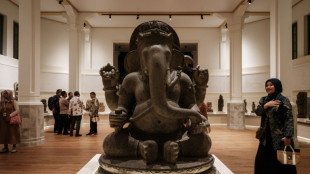
-
 Suspect in deadly Christmas market attack railed against Islam and Germany
Suspect in deadly Christmas market attack railed against Islam and Germany
-
At least 32 die in bus accident in southeastern Brazil

-
 Freed activist Paul Watson vows to 'end whaling worldwide'
Freed activist Paul Watson vows to 'end whaling worldwide'
-
Chinese ship linked to severed Baltic Sea cables sets sail

-
 Sorrow and fury in German town after Christmas market attack
Sorrow and fury in German town after Christmas market attack
-
Guardiola vows Man City will regain confidence 'sooner or later' after another defeat

-
 Ukraine drone hits Russian high-rise 1,000km from frontline
Ukraine drone hits Russian high-rise 1,000km from frontline
-
Villa beat Man City to deepen Guardiola's pain

-
 'Perfect start' for ski great Vonn on World Cup return
'Perfect start' for ski great Vonn on World Cup return
-
Germany mourns five killed, hundreds wounded in Christmas market attack

-
 Odermatt soars to Val Gardena downhill win
Odermatt soars to Val Gardena downhill win
-
Mbappe's adaptation period over: Real Madrid's Ancelotti

-
 France's most powerful nuclear reactor finally comes on stream
France's most powerful nuclear reactor finally comes on stream
-
Ski great Vonn finishes 14th on World Cup return

-
 Scholz visits site of deadly Christmas market attack
Scholz visits site of deadly Christmas market attack
-
Heavyweight foes Usyk, Fury set for titanic rematch

-
 Drone attack hits Russian city 1,000km from Ukraine frontier
Drone attack hits Russian city 1,000km from Ukraine frontier
-
Former England winger Eastham dies aged 88

-
 Pakistan Taliban claim raid killing 16 soldiers
Pakistan Taliban claim raid killing 16 soldiers
-
Pakistan military courts convict 25 of pro-Khan unrest

-
 US Congress passes bill to avert shutdown
US Congress passes bill to avert shutdown
-
Sierra Leone student tackles toxic air pollution

-
 German leader to visit site of deadly Christmas market attack
German leader to visit site of deadly Christmas market attack
-
16 injured after Israel hit by Yemen-launched 'projectile'

-
 Google counters bid by US to force sale of Chrome
Google counters bid by US to force sale of Chrome
-
Russia says Kursk strike kills 5 after Moscow claims deadly Kyiv attack

-
 Cavaliers cruise past Bucks, Embiid shines in Sixers win
Cavaliers cruise past Bucks, Embiid shines in Sixers win
-
US President Biden authorizes $571 million in military aid to Taiwan

-
 Arahmaiani: the Indonesian artist with a thousand lives
Arahmaiani: the Indonesian artist with a thousand lives
-
Indonesians embrace return of plundered treasure from the Dutch

-
 Qualcomm scores key win in licensing dispute with Arm
Qualcomm scores key win in licensing dispute with Arm
-
Scientists observe 'negative time' in quantum experiments

-
 US approves first drug treatment for sleep apnea
US approves first drug treatment for sleep apnea
-
US drops bounty for Syria's new leader after Damascus meeting

-
 Saudi man arrested after deadly car attack on German Christmas market
Saudi man arrested after deadly car attack on German Christmas market
-
'Torn from my side': horror of German Christmas market attack

-
 Bayern Munich rout Leipzig on sombre night in Germany
Bayern Munich rout Leipzig on sombre night in Germany
-
Tiger in family golf event but has 'long way' before PGA return

-
 Pogba wants to 'turn page' after brother sentenced in extortion case
Pogba wants to 'turn page' after brother sentenced in extortion case
-
Court rules against El Salvador in controversial abortion case

-
 French court hands down heavy sentences in teacher beheading trial
French court hands down heavy sentences in teacher beheading trial
-
Israel army says troops shot Syrian protester in leg

-
 Tien sets-up all-American NextGen semi-final duel
Tien sets-up all-American NextGen semi-final duel
-
Bulked-up Fury promises 'war' in Usyk rematch

-
 Major reshuffle as Trudeau faces party pressure, Trump taunts
Major reshuffle as Trudeau faces party pressure, Trump taunts
-
Reggaeton star Daddy Yankee in court, says wife embezzled $100 mn

-
 Injured Eze out of Palace's clash with Arsenal
Injured Eze out of Palace's clash with Arsenal
-
Norway's Deila named coach of MLS Atlanta United

-
 Inter-American Court rules Colombia drilling violated native rights
Inter-American Court rules Colombia drilling violated native rights
-
Amazon expects no disruptions as US strike goes into 2nd day


Storm fears overshadow India coast decades after tsunami
The deadly tsunami that swamped India's southern coast two decades ago was a one-off disaster, but storms that are growing ever more intense spark panic each time howling gales whip up waves.
Maragathavel Lakshmi shudders when she hears lashing rains or winds, recalling how her daughter was swept away when the 2004 tsunami, triggered by a huge earthquake off Indonesia, crashed onshore almost without warning.
"Weather alerts have made life easier, but the fear of what a heavy rain or strong wind might bring is still there," 45-year-old Lakshmi said.
More than 220,000 people were killed as the devastating waves hit shorelines around the Indian Ocean, including 16,389 in India, according to the international disaster database EM-DAT.
Fear of the weather is based on a very real threat -- and the risks are increasing.
Dangerous cyclones, the equivalent of hurricanes in the North Atlantic or typhoons in the northwestern Pacific, are an annual menace.
Better forecasting and more effective evacuation planning have dramatically reduced death tolls, but scientists say human-driven climate change is intensifying their power.
"Summers are very harsh now and rains are heavier," Lakshmi said, saying weather alerts sent her anxiety soaring.
A warmer atmosphere holds more water, meaning rains are heavier.
"Strong winds scare us," said her husband Maragathavel, who like many in the region goes by only one name.
"Every time it rains heavily, water (floods) our area," the 49-year-old fisherman added. "It seems on those days that the sea has still not left us."
- 'Very afraid' -
The December 26, 2004 disaster was not caused by climate change but by a 9.1 magnitude earthquake that struck off Indonesia's Sumatra.
Hours later, Lakshmi heard a loud rumble and then saw enormous waves -- rising as high as 40 metres (130 feet) -- approaching her neighbourhood on the shore in Akkaraipettai, their village in Tamil Nadu state.
Lakshmi showed a photograph of her daughter Yashoda, who her father had been looking after for the day next door when the waves struck.
"She would have been 22 years old now," Lakshmi said tearfully.
The 45-year-old remembers people getting swept away or holding on to whatever they could.
"Some people were naked or barely had any clothes left on them," she said.
The tsunami also hit the chain of Andaman and Nicobar islands, where at least 4,000 people were killed. The victims included 109 Indian air force pilots, crew and around 40 of their relatives.
At least 870,000 people were left homeless in India.
Many, like Lakshmi, were moved to new settlements inland.
Their neighbour, fisherman P. Mohan, 46, said weather alerts still gave him shivers of fear.
"If I see some warning about the weather, I do not even step out of the house," he said.
"Until the rains or cyclone -- whatever is the warning -- comes and goes away, I am very afraid."
- 'Cannot control nature' -
Mohan had a rod put into his leg after being injured in the tsunami, which also killed his mother.
Neighbours had last seen her sitting beside the sea when the waves hit.
He could not identify her from the "swollen and disfigured" corpses laid out for identification in the days after the tsunami.
"Was she buried along with other people who could not be identified? Is her body still in the sea?" he asked. "I do not know."
A few friends told him that they might have seen his mother's body amid other unidentified corpses.
It took him a decade to fully accept her loss and hold symbolic final rites.
A seawall made of concrete and bricks of homes destroyed by the tsunami now divides land from water.
Villagers hold prayers each day at a temple to a Hindu deity believed to protect them from the sea.
But Mohan said he now simply accepted his fate.
"God cannot control nature," he said. "What has to come, will come."
S.Caetano--PC
